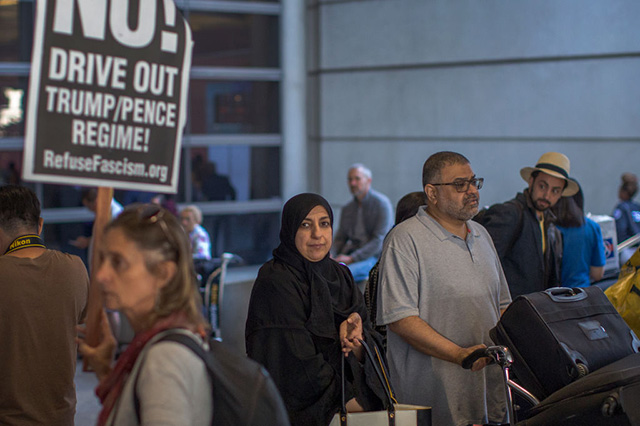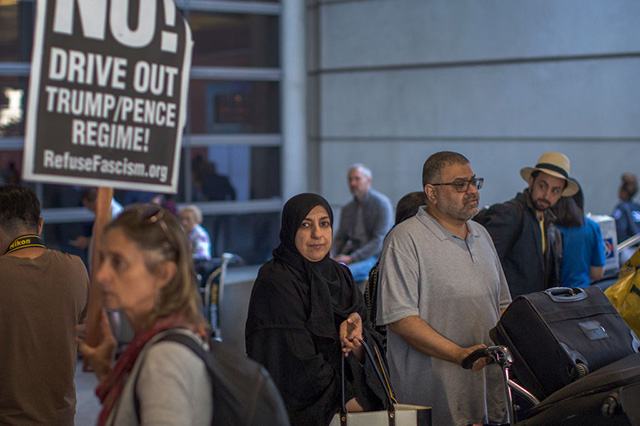
 Arriving international travelers pass protesters on the first day of the the partial reinstatement of the Trump travel ban, temporarily barring travelers from six Muslim-majority nations from entering the US, at Los Angeles International Airport on June 29, 2017. (Photo: David McNew / Getty Images)
Arriving international travelers pass protesters on the first day of the the partial reinstatement of the Trump travel ban, temporarily barring travelers from six Muslim-majority nations from entering the US, at Los Angeles International Airport on June 29, 2017. (Photo: David McNew / Getty Images)
The Trump administration has revised the travel ban that it originally issued in January 2017. But the new ban, unlike the old one, has not drawn spontaneous crowds of protesters to the airports as it did initially, in part because it has been framed as a compromise: This time, immigrants from “Muslim-majority countries” (Iran, Libya, Somalia, Sudan, Syria and Yemen) will be allowed to apply for entry to the US through a visa, provided they have proof of an existing “bona fide” relationship to a family member who currently resides in the United States.
So, what do the courts mean by a “bona fide” family relationship? “Bona fide,” Latin for “in good faith,” or “genuine,” has been arbitrarily defined by the courts as parents (including in-laws and stepparents), spouses, fiancé(e)s, children (including sons and daughters-in-law), siblings and half-siblings. Any other family members — among them grandparents and grandchildren, aunts, uncles, nieces, nephews and cousins — will not be considered “true” family members, and will thus be banned from entering the country.
Shortly after the Trump administration reinstated the new version of the ban, Muslim-Americans quickly began to flood Twitter and other social media platforms with photos of elderly family members, asking how, exactly, an Iranian grandmother poses a threat so severe to the state that she must be considered a terrorist suspect. But the more pointed question to ask, perhaps, is: Why is the state invested in regulating — in a rather violent manner — who counts as kin? Put another way: What is the state’s investment in promoting certain types of families over others? And does this investment signal a departure from the norm, or the continuation of a trend?
Deconstructing the Nuclear Family
What is immediately noticeable about the Trumpian version of the family — parents, spouses, children and siblings — is that it looks suspiciously like a white, upper-middle class version of a family. The deliberate exclusion of grandparents and grandchildren, aunts, uncles, nieces, nephews and cousins — none of which are considered “bona fide” family members by the state — is an insidious imposition of white supremacy onto Muslim immigrants because it eliminates the wider kin networks of support that many families of color need to survive in a welfare-gutted society that actively refuses to provide for their basic needs.
The reason an Iranian grandmother (or for that matter, a Lebanese aunt, a Somali cousin, or a Sudanese niece or nephew) poses a threat to the Trumpian state is not because she is a potential terrorist, but rather because she is a crucial source of care and support for immigrant families of color in a society whose government regularly and deliberately de-prioritizes their basic needs. A family of non-white, non-citizen, non-Christian, non-wealthy people in the United States fundamentally depends upon the very extended kin networks that the state is now banning from entering the country. Gutting those networks is a speedy way to ensure their demise.
Grandparents, aunts and uncles are necessary and “bona fide” family members to a mother who works full time and cannot afford childcare for her child. Immigrant families cannot always afford to be nuclear families. In an interview with the Guardian, Mark Wasef, a senior attorney at the International Refugee Assistance Project, noted: “The family structures in the Middle East tend to be different to how they are in the US. At some points aunts and uncles might raise a child, or the grandparents might do so, and if this child is here and wants to bring over their aunts and uncles they can’t do that over the next 90 days … showing again who the real target of this travel ban is.”
Similarly, Rama Issa, a 29-year-old Syrian American who came to the US when she was 15, said in an interview with Quartz Media that her grandparents raised her. “Your grandparents are your ancestors, they pass on the bloodline to you, they define who you are,” she said. “The idea that someone can define family to just [the] nuclear — your parents, your siblings — is pretty outrageous to me, because I was raised by my grandparents, because my cousins are like brothers to me.” In the Arab community, she noted, the idea of separating relatives into “nuclear” and “extended” families is a foreign concept.
Allegedly, the court claims that its definition of “bona fide” family members (parents, children, siblings) is not arbitrary, but is rather a holdover from a clause based in the 1965 Immigration and Nationality Act, which abolished the quota system based on national origins that had constituted US immigration policy since as far back as the 1920s. The 1965 Immigration Act thus marked a change from past US policy by creating new visa categories that focused on immigrants’ skills and family relationships with citizens already residing in the US — rather than limiting visa eligibility to national origin alone. And historically, the 1965 Immigration Act resulted in a large influx of non-white immigrants from Asian and Latin American countries.
However, the court’s argument that its current definition of “bona fide” family is actually a vestige of the 1965 Immigration Act is spurious at best, because the closest that clause comes to defining close family is a section that describes “immediate relatives” as children younger than 21, spouses and parents. According to the 1965 clause, those relatives get preference for visas. It never says, however, that all family members other than those people would be banned from entering the country altogether.
Let’s also not forget about the fact that, several days after the administration defined “bona fide” family members as parents (including in-laws and stepparents), spouses, children (including sons and daughters-in-law), siblings and half-siblings, it added, as if in after-thought: fiancées. In a recent interview with a journalist from the Los Angeles Times, Peter Spiro, a law professor at Temple University, noted that the administration’s definition of family is “all over the place.”
Part of the reason the new travel ban is so insidious is because it presents itself as an act of benevolence — i.e. claiming to relax the rules of the original ban by now allowing in “family members” of Muslim people residing in the US — while at the same time, limiting the definition of “family” to one that reflects the realities of white, upper-middle class families alone. Another key aspect of its insidiousness — and an important reason why it has not and probably will not draw crowds of supporters to the airports as the earlier version of the ban did in January — is because it applies only to people overseas who are applying for visas to come to the United States, not those who have already been granted passage from abroad.
In other words, people affected by the new travel ban will still be in their home countries, not at US airports demanding to be let in. This means that it will be difficult for mass protests to occur, since there will be no one at the airports whose entrance we might demand in the first place. This must be noted as another key strategy of the Trump administration to reduce the likelihood of revolt.
The Trump administration’s updated Muslim ban is drawing outrage because it is allegedly “redefining what a family is,” dictating who does and does not count as kin. But is the notion that the state determines who counts as kin really a new one? If a family is essentially a network of people who exhibit ties of mutual care and dependence (and who are sometimes — but not necessarily — related by blood), then there are countless examples of relationships that fit the bill, but which the state has refused to recognize as legitimate, that is, legal family.
Let’s remember that gay marriage laws were only passed two years ago in the United States. That means that, according to the state, a woman’s life partner, if she was a woman, did not legally have visitation rights at the hospital. Let’s remember that, even with the passage of gay marriage laws, there are still so many types of care-based relationships that aren’t recognized or acknowledged by the state, and cause some degree of harm to the people involved as a result.
This is not, of course, an argument in favor of state legitimation of all forms of self-identified families. There is no particular reason why we should aspire to have all of our relationships named and acknowledged by the state. It is, however, a reminder that the state has long been in the business of deciding who counts as kin — and rest assured, it will adjust those definitions over time based on what appears to be most beneficial for it at any given moment.
Join us in defending the truth before it’s too late
The future of independent journalism is uncertain, and the consequences of losing it are too grave to ignore. To ensure Truthout remains safe, strong, and free, we need to raise $27,000 in the next 24 hours. Every dollar raised goes directly toward the costs of producing news you can trust.
Please give what you can — because by supporting us with a tax-deductible donation, you’re not just preserving a source of news, you’re helping to safeguard what’s left of our democracy.